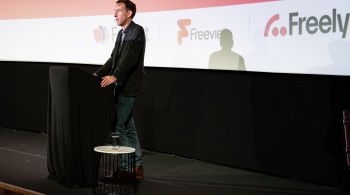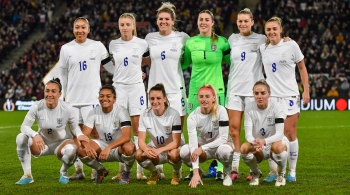
A speech given by Everyone TV CEO, Jonathan Thompson at Outside the Box 2023
Good morning everyone.
It is a real privilege to be together today in such an iconic venue.
No matter how many times I walk through the Turbine Hall it still sends a shiver down my spine.
We are very lucky that the magnificence of this building – and what lies inside – is open to everyone to enjoy.
It’s easy to forget that it is only 20 years since the principle of free access to our museums and art galleries was re-introduced in this country.
Former Culture Secretary Chris Smith – the architect of this New Labour policy - said it was based on a simple truth:
that free admission is about giving everyone, no matter what their means, the chance to see the greatest works of art, science and history that our nation has.
Imagine if you changed that to:
free admission … as long as you live in the right part of the country, as long as you can afford to get here by taxi and as long as you have the right code to get in through the main doors.
Free admission does not, thank goodness, come with any strings attached. And nor does free TV, which has ensured everyone has access to our best British ideas and creativity. But that universal access – so important that it should be added to the Reithian principles of inform, educate and entertain – is under threat.
I want to talk today about its future and why we should all care about it at least as much as Chris Smith cared about our cultural institutions.
The importance of universality
As an industry, we focus much of our debate on the creative role it plays in our society.
And rightly so – broadcasting is nothing without the stories that make us laugh, make us cry or make us think and react.
Distribution is of course the means not the ends. Ringo’s back-beat to Paul, George and John’s melodies.
But the health of a public service broadcasting system also relies on those stories being public – that is, available to everyone, regardless of who you are, where you are, or what your views on the world happen to be.
So, universality – and the ways in which content is distributed and found - may not – like Ringo - be the glamorous side of our industry – but it is the pulse that delivers the ideas to all.
In simple terms, it was universality that allowed us to all share in the euphoria of the Lioness’s inspirational victory in the Summer, as discussed by our previous panellists.
That brought us together during the darkest days of the Global pandemic.
And that saw a nation pause as it shared millions of personal - and one collective - moment of grief at the passing of the Queen.
Universality drives connections
But does any of this really matter as we happily binge away on the latest series of White Lotus, Succession, The Bear or, in my case… The Masked Singer?
When a seemingly infinite supply of lavish shows from around the world can be personalised and streamed direct to my TV – do old-fashioned notions like universality have relevance anymore?
Well, it matters because of the connections that universality builds.
The connection between British programme makers and their audience.
The connection between British viewers and the world around them.
And most importantly from the point of view of a society which is more prone to losing common beliefs and goals than creating them – the connection it enables between British viewers.
The shared experience of watching together as a family or a society, to celebrate shared moments of joy and be reassured in moments of crisis.
To encourage us all to be curious about the world and those around us.
To challenge our own perspectives and prejudices.
To make us think about what we don’t know about who we are as a country, rather than simply reinforce what we already do know – or think we know.
Universality is under threat – it needs to evolve to survive
But of course while principles can endure, their manifestation needs to change to reflect how the world, technology, and consumers are changing around us.
Universality was a simple premise to understand and deliver in an analogue world, and we’ve collectively done a good job of ensuring it has been maintained in the age of digital broadcasting.
But as we move into the third era of television – the streaming age – we must think about how we can ensure that the principle of universality endures.
Walking the halls of the Consumer Electronics Show in Las Vegas earlier this month was a vivid illustration of where the global TV landscape is heading.
What once would have been a demonstration of the latest innovations in TV hardware - the 'what' of viewing…
…is now increasingly a demonstration of how major players are seeking to shape the user experience – the 'how' of viewing.
One of the companies we met at CES described their strategy of moving into the technology of TV recommendations and curation as "democratising TV for the viewer".
Allow the algorithm to give you the TV you want to watch” – not what the broadcasters want you to watch.
So what, some might say? If technological innovation drives a better customer experience – what’s the problem?
Well we should never want to hold innovation back. But that innovation should not become the sole or even the main gateway to British viewers being able to find British content.
Nor should it lead to 'echo chambers' of TV viewing where we’re served up what we already know we like, not what we might like.
Every day, it seems, we hear a warning from the dark-side of social media of the real dangers when consumer outcomes are determined only by an algorithm, based on the philosophy that more of what you want is all you need.
Let’s not make the same mistakes – and fall into the trap of allowing the future of how people find and watch TV to be shaped not just partially – but entirely - by global players whose fundamental responsibilities are not to British viewers or the strength of democracy in Britain.
Given this risk, we need to be absolutely clear, as we start to think about the transition to a TV world delivered over the internet, what are the outcomes we are seeking to achieve.
Sustaining universality in the streaming age
In its most simple form, we need to deliver what Freeview offered when it launched twenty years ago.
We need to ensure that every TV home in this country can access the output of our public service broadcasters, simply and easily on their TV.
And make sure the opportunities and potential of the streaming age are available for all – with nobody left behind.
And that’s why this future cannot be left entirely to market forces to deliver.
There is now an urgent need for Government to be clear on the public role that TV will continue to play in our society. And establish the framework of what we mean by universality in the streaming age.
A core part of this is the forthcoming Media Bill that we hope will shape the revised prominence and inclusion regime for public service broadcasters.
But just like digital switchover over a decade ago, once the policy is set, it should then be left to industry to deliver.
For me, there are three parts to how industry comes together to ensure we deliver all the benefits of universal TV in the streaming age. Public service collaboration, industry partnership and innovation.
PSB collaboration
The PSBs have a long history of collaboration in the way their channels, programmes and players are delivered to viewers. This collaboration has never been more vital.
That’s why the coming together of all our national PSBs in Digital UK last year was such a critical step.
In a TV world increasingly shaped by multi-billion dollar companies, it is ever harder for one individual broadcaster in one country to shape the future of distribution and discovery alone.
But working together, if there is one industry in any country that can do it, it is here and is these broadcasters.
Industry partnership
But collaboration between PSBs is only part of the story.
The health of the UK’s broadcasting sector is also built on a wider set of partnerships across the industry.
We need an ecology that is open and competitive – where we can harness the undoubted innovation and expertise of global tech firms.
But we can also ensure that viewers have choice and flexibility of great programming from anyone willing and able to create it.
The evolution of Free TV
And finally – we need to continue to innovate in the services we offer and the way in which we engage our viewers.
Our recent merger with Freesat means that we can now think about the future of free TV on a platform agnostic basis – to offer viewers a great service regardless of whether they have an aerial, a dish or an internet connection.
We believe that access to free TV - for all - is a core part of the democratic make-up of our country.
And that’s why Digital UK is today, changing its name to Everyone TV.
Our goal – working for our shareholders and with our partners – is to evolve the services we offer to our viewers, building on the strengths of broadcast TV – and embracing the potential of the streaming age.
To ensure that everyone in the UK has access to great TV, maybe the greatest TV there is.
Something worth fighting for
Sometimes it is the simplest of ideas that can be the most powerful. That the greatest achievements from history, science and art – that define who we are as a nation - belong to and should be open to all of us.
That public spaces – such as where we gather today – are where we can go to learn about who we are, where we come from and how we fit into the world.
At a time when it can feel like technological forces are allowing us to sleep walk into a million cul-de-sacs of our own personal experience, surely we should be embracing those moments when we come together as one?
Universality enshrines the role that TV can play not just in my life, or your lives, but the role it can play in all our lives – in our society.
That’s why Public service broadcasting doesn’t belong to a group of subscribers, customers or shareholders. It does not belong to politicians to fiddle with and test for ideological purity.
It belongs to all of us.
Make no mistake – this is a pivotal moment in the story that is British TV. We collectively have the opportunity to shape a broadcasting landscape a decade from now that remains as competitive, creative and inclusive as it is today.
If you only take one thought away from my talk - it’s that universality as we know it is under threat - and that we can’t allow the future of what we watch on TV to be left to an anonymous algorithm.
British creativity will always remain at the heart of our broadcasting system, but we also need to ensure that the arteries that allow these ideas to flow remain open to all.
Everyone TV – working with its partners – will work tirelessly in ensuring that the positive benefits of our unique broadcasting system remain available – for everyone.
Thank you.



